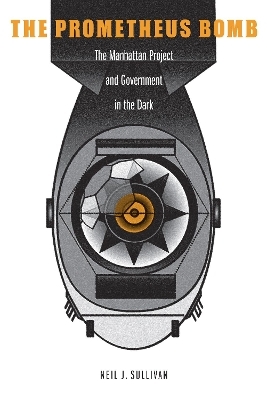
The Prometheus Bomb
The Manhattan Project and Government in the Dark
Seiten
2016
Potomac Books Inc (Verlag)
978-1-61234-815-5 (ISBN)
Potomac Books Inc (Verlag)
978-1-61234-815-5 (ISBN)
- Lieferbar (Termin unbekannt)
- Versandkostenfrei
- Auch auf Rechnung
- Artikel merken
The Manhattan Project was the first example of a new type of choice for congressmen, presidents, and other government officials: life and death on a national scale. Through the story of the Manhattan Project, Neil J. Sullivan asks by what criteria the people in charge at the time made such critical decisions. He also ponders how similar judgments are reached today.
During World War II, the lives of millions of Americans lay precariously in the hands of a few brilliant scientists who raced to develop the first weapon of mass destruction. Elected officials gave the scientists free rein in the Manhattan Project without understanding the complexities and dangers involved in splitting the atom.
The Manhattan Project was the first example of a new type of choice for congressmen, presidents, and other government officials: life and death on a national scale. From that moment, our government began fashioning public policy for issues of scientific development, discoveries, and inventions that could secure or threaten our existence and our future. But those same men and women had no training in such fields, did not understand the ramifications of the research, and relied on incomplete information to form potentially life-changing decisions.
Through the story of the Manhattan Project, Neil J. Sullivan asks by what criteria the people in charge at the time made such critical decisions. He also ponders how similar judgments are reached today with similar incomprehension from those at the top as our society dives down the potential rabbit hole of bioengineering, nanotechnology, and scientific developments yet to come.
During World War II, the lives of millions of Americans lay precariously in the hands of a few brilliant scientists who raced to develop the first weapon of mass destruction. Elected officials gave the scientists free rein in the Manhattan Project without understanding the complexities and dangers involved in splitting the atom.
The Manhattan Project was the first example of a new type of choice for congressmen, presidents, and other government officials: life and death on a national scale. From that moment, our government began fashioning public policy for issues of scientific development, discoveries, and inventions that could secure or threaten our existence and our future. But those same men and women had no training in such fields, did not understand the ramifications of the research, and relied on incomplete information to form potentially life-changing decisions.
Through the story of the Manhattan Project, Neil J. Sullivan asks by what criteria the people in charge at the time made such critical decisions. He also ponders how similar judgments are reached today with similar incomprehension from those at the top as our society dives down the potential rabbit hole of bioengineering, nanotechnology, and scientific developments yet to come.
Neil J. Sullivan is a professor in the Austin W. Marxe School of Public and International Affairs at Baruch College–City University of New York. He has published several books, including The Diamond in the Bronx: Yankee Stadium and the Politics of New York and The Dodgers Move West.
List of Illustrations
Acknowledgments
Introduction
1. A Squash Court in Chicago
2. FDR and the Einstein Letter
3. A Bungled Start
4. The President’s Man and the Liberal State
5. MAUD—Working with the British
6. The German Bomb
7. Secrets and Spies
8. Congress Rebounds
9. The Transition to Truman
10. Hiroshima
11. Science and Democracy
Notes
Bibliography
Index
| Erscheinungsdatum | 27.11.2016 |
|---|---|
| Zusatzinfo | 23 photographs, 3 illustrations, index |
| Verlagsort | Dulles |
| Sprache | englisch |
| Maße | 152 x 229 mm |
| Themenwelt | Sachbuch/Ratgeber ► Geschichte / Politik ► Allgemeines / Lexika |
| Natur / Technik ► Fahrzeuge / Flugzeuge / Schiffe ► Militärfahrzeuge / -flugzeuge / -schiffe | |
| Geschichte ► Allgemeine Geschichte ► 1918 bis 1945 | |
| Geisteswissenschaften ► Geschichte ► Regional- / Ländergeschichte | |
| Geschichte ► Teilgebiete der Geschichte ► Militärgeschichte | |
| Sozialwissenschaften ► Politik / Verwaltung ► Politische Systeme | |
| Sozialwissenschaften ► Politik / Verwaltung ► Staat / Verwaltung | |
| Technik | |
| ISBN-10 | 1-61234-815-7 / 1612348157 |
| ISBN-13 | 978-1-61234-815-5 / 9781612348155 |
| Zustand | Neuware |
| Haben Sie eine Frage zum Produkt? |
Mehr entdecken
aus dem Bereich
aus dem Bereich
von der Machtergreifung bis zur Gründung der Vereinten Nationen
Buch | Softcover (2023)
Motorbuch Verlag
CHF 38,90


